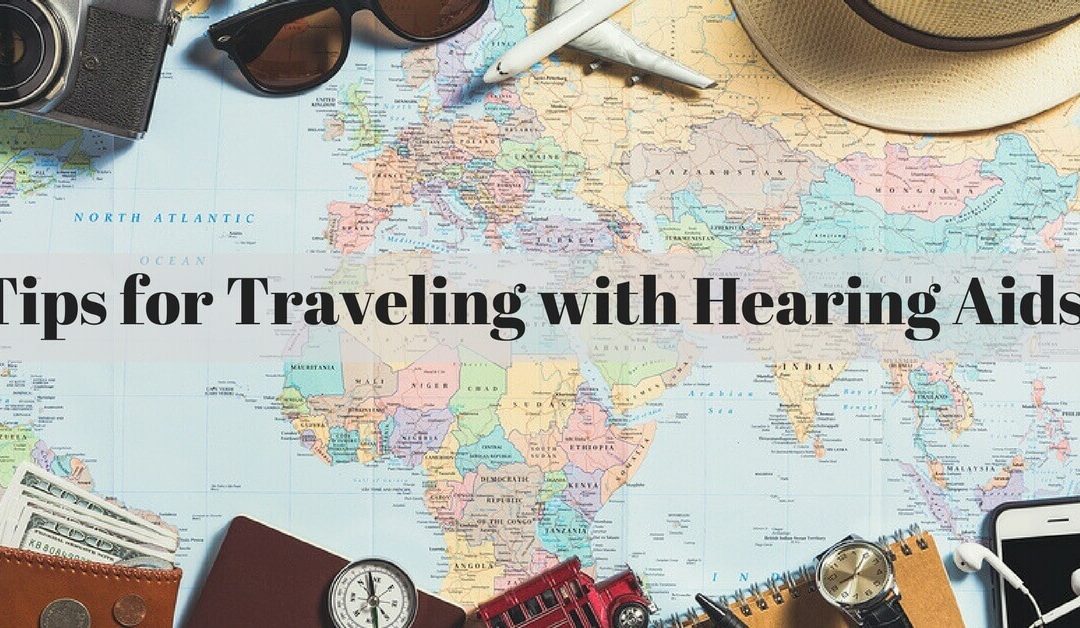Traveling always comes with its stresses, but traveling with hearing loss comes with an added layer. When everyone is a rush to get to their family reunions or to relax on the beach, being in public transportation hubs from train stations to airports can be overwhelming. With a few arrangements and planning, your travels – whether near or far – can be streamlined and stress-free.
Before You Travel
Whether you are new to hearing aids, or a seasoned wearer, you are familiar with the many significant benefits they bring to your life. Hearing aids connect you to your environment by clarifying and amplifying sounds and speech. In the same way you’d tune up a car before a big road trip, you want to make sure that your hearing aids are in proper working order before you hit the road!
Schedule a maintenance check and cleaning with your audiologist or hearing specialist. If you’ve experienced issues with your hearing aid, ask them to take a closer look before you go on your trip. Regular maintenance checks and cleanings are good for your hearing aids, and also to ensure that you are still hearing at proper levels.
When packing, be sure to include your hearing aid cleaning supplies and batteries. If you use traditional hearing aid batteries, make sure to pack an abundant supply. You never know whether you can find the exact battery you need, so it’s better to be safe than sorry! For people who use rechargeable hearing aids, make sure to pack the recharging station. If you plan to travel to a foreign country, check their electrical outlet requirements, as you may need to get a converter. Also, pack a secure carrying case for your hearing aids, especially if you plan on taking them out throughout the day for certain activities.
Remember that moisture is an enemy of your hearing aids! If you are traveling to a warm, humid climate, invest in a dehumidifying unit for your hearing aids. These units remove moisture and ensure that your hearing aids will function properly.
If you use assistive listening devices (ALDs) or a portable, vibrating alarm for waking up, be sure to pack them and have extra batteries.
Planes, Trains and Automobiles
Before you go, set up your phone to receive alerts and texts from your airline, informing you of any changes to your schedule.
Between the crowds of people and fuzzy announcements on the PA systems, public transportation hubs and airports are some of the most challenging noise environments for people who are hard of hearing. You may have difficulty hearing announcements about changes to your flight/bus/train schedule, or it may be a challenge to hear your ticket agent through the window or across the counter. Print out hard copies of all of your travel documents and keep them on hand, just in case.
If your travel plans take you through many different busy hubs, consider getting an assistive listening device. Hearing aids do a great deal for us, even in noisy spaces, but when it comes to the time-sensitive nature of travel, it might help to have an extra boost.
Some airports and public transportation hubs are equipped with services to assist people who are hard of hearing, such as hearing loops. Hearing loops stream sound from a microphone or PA system directly to your hearing aids, when on the telecoil setting. Are you unsure whether your hearing aids have this capability? Check with your audiologist or hearing specialist to learn more about the telecoil and hearing loop option.
Upon Your Arrival
If you are staying at a resort or hotel, contact the customer service department and inquire about accessibility options for the hard of hearing. In the US, hotels are required to provide accessibility options in accordance to the Americans with Disabilities Act. Accommodations include wake up calls, lit-up security systems for fire, or vibrating alarm clocks. There are also options to amplify sound for the TV and telephone.
If you are staying with your family or friends, be sure to communicate with your loved ones about your hearing needs. For example, if you are attending a family reunion that may be busy, tell your family to come look for you – rather than calling out your name from across the room. When removing your hearing aids, be sure to store them in a cool, dry place that is out of reach. The small parts of your hearing aid may be a hazard to children and pets, while storing your hearing aids in a place that collects moisture may cause damage to the electronic parts.
Travel is one of the joys of life, and with these simple adjustments and preparations, you’re on your way to a great trip! If you are concerned about your hearing and how it may affect your travels, contact an audiologist or hearing specialist today.

